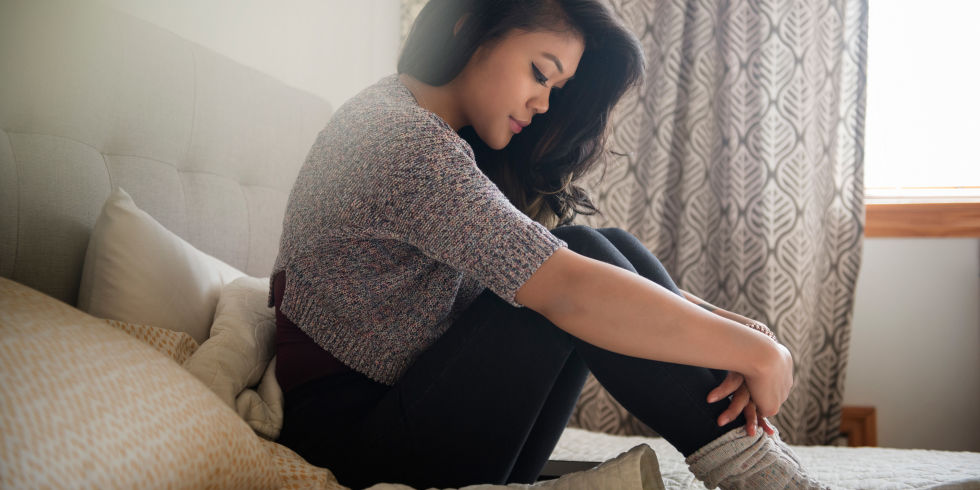If you’ve ever woken up with a churning knot in your stomach, you’re not alone. Most of us have experienced ‘morning anxiety’ at some point – whether it’s over an upcoming meeting at work, or a generalised feeling of anxiety over something you can’t quite pinpoint.
Either way, you’re not alone. Stress and anxiety are on the rise and according to recent research, a third of young people feel more anxious now than this time last year for a variety of reasons, from money worries to housing costs.
More than one in 10 people are likely to have a ‘disabling anxiety disorder’ at some stage in their life.
And for many people, the effects of anxiety are felt most acutely straight after waking up.
‘The morning is a time where many people will often experience the symptoms of anxiety,’ says Nicky Lidbetter, CEO of Anxiety UK.
‘For example, if you regularly wake up feeling nauseous, this could be an indicator that anxiety is affecting your day to day functioning.’
Reasons for anxiety in the morning
So why do some of us feel so anxious first thing? According to Lidbetter, one reason may be that we are more alert in the morning.
‘After a restful night’s sleep, we are more refreshed and ready to process information. Having relaxed so well in our sleep, we can therefore unfortunately, be caught off guard by the anxious thoughts first thing in the morning and a brain that is refreshed and ready to engage with these thoughts,’ she explains.
‘Throughout the rest of the day we usually become more tired and hence have less capacity to explore these worries and stressors.’
Another factor is that we’re also more likely to focus on our thoughts in bed, which as Lidbetter says, can be both a good and bad thing for people with anxiety.
‘Mornings are also usually a time to think about the day ahead which can generate lots of hypothetical “what if” anxiety about new or difficult situations which may be due to happen that day,’ she adds.
Even our dreams can affect our anxiety levels when we wake up, such as having a nightmare, which can trigger anxious feelings when we aren’t consciously aware of them.

‘Some people may wake up feeling as if their nightmares actually happened and will feel the real physical symptoms of an anxious situation that has only happened in the dream,’ Lidbetter says.
Many of us wake up to an alarm which may interrupt our rest and jolt us awake, which may also trigger anxiety. Lidbetter says this is because our alarms simulate a ‘fear response’ in our bodies which is similar to ‘an anxious fight or flight response’ if it awakens us during particular sleep phases.
As many people living with anxiety know, it can be extremely debilitating on a day-to-day basis, affecting both physical and mental health.
‘I feel like it will set me up for a negative day if I don’t try really hard not to let it,’ Laura says. ‘I feel exhausted before the day has really begun, I think that’s the worst thing about it.’
How to combat morning anxiety
There are steps you can take to help reduce feelings of anxiety first thing in the morning, such as giving yourself extra time to get ready and meditating using wellness apps.
‘You can do many things that may help with your morning anxiety,’ Lidbetter says. ‘One of the most effective ways to combat morning anxiety, is to give yourself a little extra time – for example, setting your alarm 10 minutes earlier.
‘This can help you to wake up and avoid the additional stress of having to rush and the potential for worrying about being late.’
And instead of reaching for the coffee, swapping to camomile tea might help too – as stimulants can often exacerbate anxious symptoms.
Looking at Facebook and Twitter first thing is also a no-no. ‘Avoiding social media first thing may also help if you feel yourself constantly needing to check your feeds and find yourself becoming anxious as a result of social media pressures,’ Lidbetter says.
Mindful meditation or yoga may also help. ‘The popular application Headspace – available as part of Anxiety UK membership – can help you to check in with your emotions and thoughts and relax and prepare you for the day ahead.’
Laura says she puts Netflix on and watches something predictable, or uses the Headspace app in the morning.
‘I start it before I’ve really woken up and that really eases a lot of it for me.’
And if you have time, yoga or exercise may help too. ‘Yoga may help to channel your energy and help to switch off your fight or flight stress response,’ says Lidbetter.
‘Similarly, exercise first thing in the morning can release endorphins to combat low mood or anxiety.’
It is however key to address the underlying reasons for anxiety, however – which may involve accessing counselling, Cognitive Behavioural Therapy or talking therapy support through your GP.












